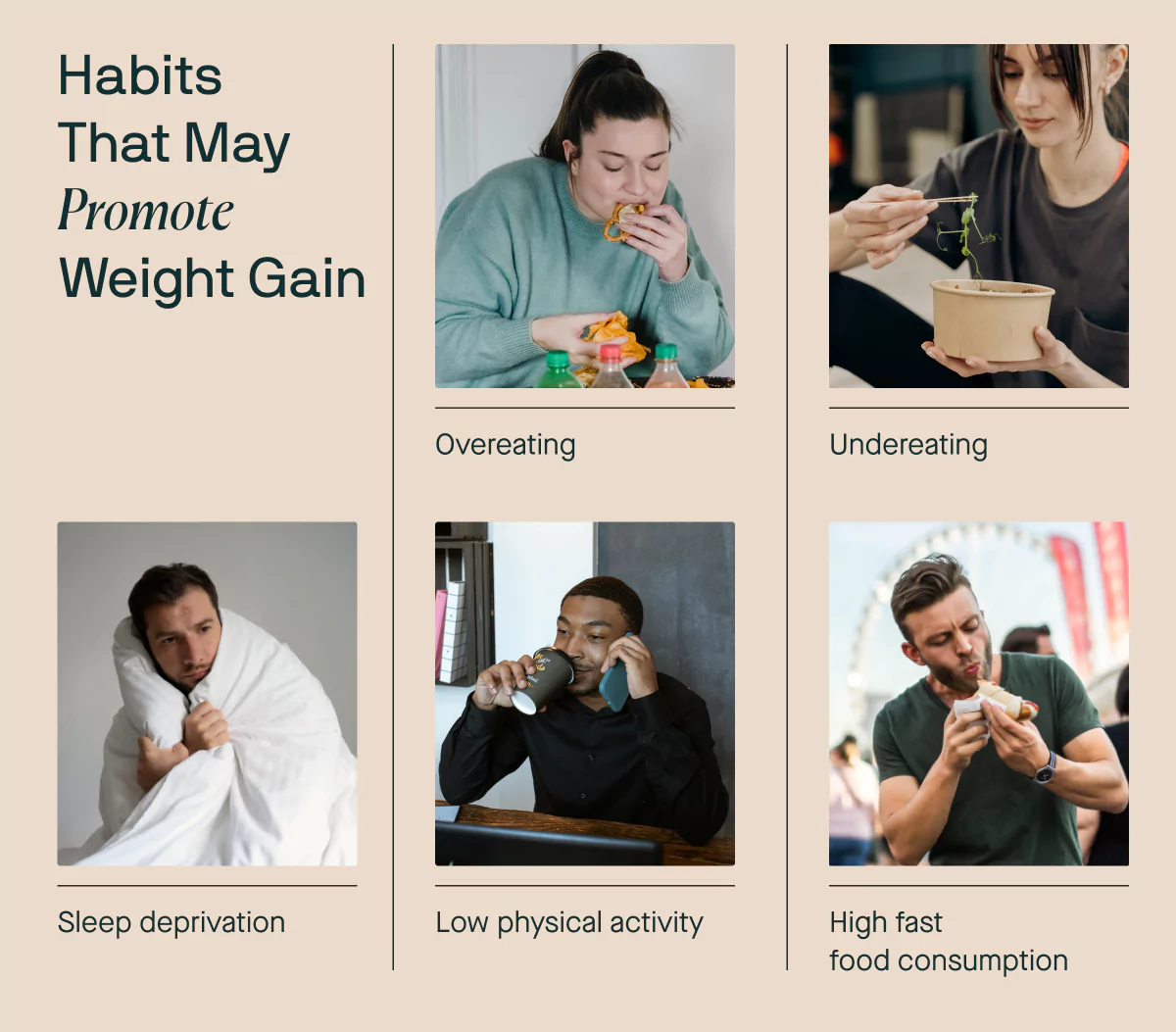Stress and Weight Gain: How to Break the Cycle

Key Takeaways
Stress affects more than your mood.
When your body stays in stress mode, it doesn’t just make you tense or ruin your mood; it can also make it harder to manage your weight! From emotional eating to disrupted sleep and energy dips, stress quietly shapes your daily habits. Understanding how is the first step to breaking that cycle.
Stress can have many implications for your physical health. It has been known to cause stomach problems, sleep problems, headaches, muscle tension, and fatigue.
Having chronic stress can also lead to conditions such as high blood pressure and cardiovascular disease. But did you know that your stress levels may also be connected to your weight?
In this article, we’ll take a look at the relationship between stress and weight gain, some stress-induced habits to avoid, and tips on how to reduce stress in your life. Read on to learn more about the connection between stress and weight gain.
How Stress and Weight Gain are Connected (and Why)

Your body is designed to handle short bursts of external and internal stressors, helping you adapt and grow. But when stress lingers, it can throw off your hormones, appetite, and energy balance. Over time, that constant “on” mode can make it harder to lose or even maintain weight.
Why stress eating happens
Pushing your body too hard with exercise that is more intense than you can handle can lead to stress-induced injury, reduced immune function, and unhealthy hormonal changes.
When we are young, we are often exposed to stressors, such as pathogens from the outside world. This exposure helps build our immune system by training it to recognize and respond to future infections: a potentially beneficial stressor.
However, when most of us talk about stress, we are likely talking about psychological stress resulting from emotional sources, such as trouble at work, problems in interpersonal relationships, or social pressures. Even though these mental health stressors don’t always put our bodies in immediate danger, we are hardwired to respond as if there is a real threat.
Studies show that this psychological stress is connected to weight gain. The exact reason why is unclear, but there are a few possible causes.
For one, stress may contribute to changes in someone’s diet, leading to weight gain. Another potential reason is the hormone cortisol, which the body releases in stressful situations.
Stress and cortisol levels

When we are stressed, our sympathetic nervous system is activated, which triggers the fight-or-flight response. This causes the body to release adrenaline, which increases our heart and respiratory rates, and the stress hormone cortisol, which is released by the adrenal glands.
Research shows a strong correlation between high cortisol levels and abdominal obesity over time, though not all obese people have elevated cortisol levels. This may be because some people are more prone to a cortisol stress response than others.
Cortisol is known to cause a redistribution of adipose tissue, or body fat, to the abdominal region. It has also been shown to increase appetite and cravings for high-calorie “comfort foods,” which can lead to weight gain.
Metabolic rate may slow down when the body is under stress
High chronic stress levels may also negatively impact thyroid hormone production and regulation. This may contribute to changes in metabolic rate and other aspects of metabolism.
Research also shows that stress can alter how our bodies metabolize food, making weight loss more difficult. A study found that added sugar and stress can both shape how much you eat and how your body uses energy. When they show up together, they can amplify each other. Stress hormones can rise, hunger and cravings can increase, and energy burn can dip.
Which stress habits lead to weight gain

Stress changes more than hormones: it changes your routines. Late-night snacking, skipped workouts, poor sleep, and constant “go-mode” all add invisible weight over time, which contribute to weight gain. Awareness is the first step toward interrupting the loop!
That 'I deserve this' moment
It’s 7 p.m. after a long, stressful day. The healthy meal you planned feels like too much work, so you end up reaching for a bag of chips. You tell yourself you’ve earned it, but you also know this is the exact cycle that leaves you feeling stuck, tired, and frustrated when the scale doesn’t move.
Overeating
Stress can trick your body into thinking it needs more fuel, even when it doesn’t. According to research, stress can alter our natural homeostasis, or balance. When cortisol rises, appetite hormones shift, prompting you to reach for sugary or high-calorie foods for quick comfort. It’s your body’s way of trying to restore balance, but it often backfires.
This often shows itself in the disruption of our eating patterns. For example, in one 2001 study, 59 premenopausal women were exposed to a stress session and a control session on different days.
Researchers found that almost 60% of the participants exposed to stress tended to consume unhealthy foods, particularly sweets. The hormones involved in our stress responses can influence our appetites, satiety, and even our food choices.
Undereating

For others, stress has the opposite effect: research shows that some people actually undereat when they are stressed. Skipping meals can seem harmless, but it keeps glucose unstable and slows metabolism, which can eventually lead to fatigue and weight plateaus. It’s unclear exactly why some people overeat and some undereat during times of stress, but it likely relates to the severity and type of stressor.
Everyone’s stress response is unique. Undereating may lead to short-term weight loss, but over time, it can increase stress hormones and cause weight gain, mood changes, fatigue, and muscle loss. Balance, not restriction, is the real goal.
Increased fast food consumption
Research shows that a consistently activated stress response can alter our brain reward/motivation pathways. This can cause people to seek hyperpalatable foods like high-fat, sugary foods, and to begin stress-eating when they are under stress.
Over time, this can also lead to changes in the brain that promote compulsive behaviors such as emotional eating, making it much harder to resist reaching for fast foods that may be unhealthy.
Getting less sleep

Stress can affect how well you sleep, leading to increased sleep disturbances and altering your circadian rhythms and sleep patterns. Studies also show that sleep loss and deprivation may affect your hunger cues by decreasing leptin levels.
Leptin is a hormone that helps maintain body weight by signaling fullness, suppressing hunger, and regulating energy. Decreased leptin levels can lead to overeating and weight gain.
Sleep deprivation can also increase ghrelin levels, which is a hormone that stimulates appetite.
Decreased physical activity
Research shows that stress can lead to a decrease in physical activity and exercise. According to the CDC, physical activity is a crucial component of healthy weight management.
Exercise can also support healthy glucose levels and boost your metabolic rate.
Find the right Nutrisense programto turn insight into progress.
Find balance between your stress, glucose, and daily habits with Nutrisense
Find balance between your stress, glucose, and daily habits with Nutrisense
How Do You Know If Your Weight Gain is From Stress?

There are many factors to consider when it comes to body weight and metabolism. If you are gaining weight and don’t know why, consult with your doctor or a qualified health professional.
Here are five tips you can use to combat unwanted weight gain.
5 Tips for Dealing with Stress-Related Weight Gain
Everyone’s experience with stress and weight gain is unique, and it’s important to listen to your body and find what works best for you. Here are some stress management tips to help you deal with stress-related weight gain.
1) Adopt mindfulness activities into your daily routine

Mindfulness is a form of meditation that involves paying attention to the present moment with openness and acceptance. Studies show that mindfulness may help with stress reduction and anxiety.
Meditation can also lower your heart rate and improve sleep quality, helping reduce stress. It may also help increase general life satisfaction.
Mindful eating to interrupt stress-driven eating
Mindful eating is a simple practice that brings attention to hunger, fullness, and the sensory experience of food during stressful moments. It gives you a clear pause between stress and what you choose to eat.
Try this quick routine:
- Before eating, rate your hunger on a scale of 0 to 10 and note your stress level.
- Take 3 to 5 slow breaths and set an intention for the meal.
- Remove distractions like TV or phones and set a gentle pace for 10 to 15 minutes.
- Take smaller bites, set your utensil down between bites, and notice taste, temperature, and texture.
- Halfway through, pause and check in. Decide whether you want more or are satisfied.
- Afterward, jot a one-line note about hunger, stress, and any urges like mindless eating or sugar cravings. Patterns are easier to spot when they are written down.
- If stress eating is persistent, consider working with a registered dietitian for structured support. Some people also explore Cognitive Behavioral Therapy with a licensed therapist to address unhelpful thought patterns around eating.
2) Get appropriate amounts of physical activity
Incorporating regular exercise into your routine can be a great stress reducer. It can release endorphins, improve your mood, and contribute to your overall health and wellbeing.
However, exercise, especially high-intensity exercise, can also be a stressor that contributes to higher cortisol levels. To find out the amount and intensity of exercise that is right for you, consult with your doctor or qualified health professional.
3) Prioritize adequate sleep habits

Studies show that sleep loss can increase cortisol levels, which also increases stress and anxiety. Good sleep habits, also known as sleep hygiene, may help increase your sleep quality.
Some good sleep habits include:
- Keeping a consistent sleep schedule
- Avoiding light-emitting screens, like phones, laptops, and tablets, before bed
- Keeping your room at a cool and comfortable temperature
- Avoiding caffeine before bed
- Practice relaxation techniques like deep breathing or progressive muscle relaxation
4) Eat a healthy, nutrient-dense diet
When it comes to stress, your diet is important. Food provides your body with fuel and the nutrients it needs to function. Nutrient imbalances are themselves a type of stress on the body. Research shows that stress can also deplete your body’s nutrients further.
A diet rich in whole, nutrient-dense foods can help bring the balance of nutrients you need. Nutrient-rich foods are naturally packed with vitamins, minerals, essential fatty acids, and other nutrients and are minimally processed, without added sugars.
These include things like:
- Colorful fruits and vegetables
- Whole grains
- Fish and seafood
- Legumes
- Nuts and seeds
- Unprocessed lean meats or soy products
5) Seek out and accept support from others

Research shows that having a strong social support network increases your resilience to stress. Reaching out to people in your life for support can help you feel less alone.
Talking through your problems with someone you trust may also go a long way in relieving the stress in your life. This includes seeking help from health professionals, like therapists and psychologists.
6) Practice self-love
Practicing self-love and self-acceptance has been shown to improve emotional well-being and may reduce stress. Studies also show that people with low self-esteem have reduced gray matter volume in brain regions involved in emotion and stress regulation.
This can make it difficult to regulate negative emotions, such as stress. People with high self-esteem tend to have greater gray matter volume in these areas. The connection here is a subject of ongoing research.
Being kind to yourself, using positive affirmations, practicing mindfulness, expressing gratitude to yourself, and practicing self-care can all help you build self-esteem and self-acceptance.
See How Stress Shapes Your Metabolism with Nutrisense
Your body’s stress, sleep, and eating patterns are more connected than they seem. With Nutrisense, you can see how everyday stressors influence your glucose, cravings, and energy, and start finding habits that help you feel steady again.
Insurance video calls
Sign up to access insurance-covered video calls with a glucose expert: a personal registered dietitian or certified nutritionist who will help tailor your lifestyle and diet to your goals.
Sensors and app
With the Nutrisense Program, you can monitor your glucose with health tech like glucose biosensors and continuous glucose monitors (CGMs), and analyze the trends over time with the Nutrisense App. This will help you make the most informed choices about the foods you consume and their impact on your health.
Start with our quiz
Ready to take the first step? Take our quiz to find the right Nutrisense program to help you take control.
Stress and Weight Gain FAQs
Q1. How can I use the Nutrisense app to track the connection between stress and changes in my weight or appetite?
A1. Log meals, workouts, sleep, and notes about stressful events in the Nutrisense app. Pair these logs with your 24/7 interstitial fluid glucose measurements to review trends around stressful days. Compare similar meals on low-stress and high-stress days, and use in-app experiments to test small changes. Share these insights with your dietitian for tailored guidance.
Source: CGM App Guide
Q2. Can I wear a sensor while swimming or showering if those activities help me unwind?
A2. Yes. The sensor is waterproof for bathing, showering, and swimming. For extra hold during longer water exposure or workouts, consider waterproof covers or patches. Let the adhesive set before getting it wet, and avoid extreme temperatures, such as saunas or ice baths. These steps can help keep the sensor secure while you follow stress-relief routines.
Source: Best CGM Patches
Q3. How soon can I start the Nutrisense program if stress is impacting my habits now?
A3. You can get started quickly. Once your program begins, you’ll start seeing your body’s responses to things like meals, movement, and stress: no guessing required. If you’ve also opted for 1:1 coaching from a registered dietitian, you can start untangling what’s driving those “stuck” days right away!
After working with a Nutrisense expert, 78% experienced improved sleep, stress, and fitness: not just food.
Source: How It Works
Q4. Will my insurance cover video calls to address stress eating or sleep challenges?
A4. Nutrisense accepts hundreds of plans from major providers across all 50 states. Over 90 percent of members' insurance plans are stated to cover video calls with zero out-of-pocket costs. You can check eligibility for free, then schedule sessions with a registered dietitian or certified nutritionist to personalize your plan.
Source: Nutritionist Video Calls
Q5. What support can a Nutrisense dietitian provide for stress-related weight concerns?
A5. Nutrisense offers a specific stress management coaching option you can make the most of in the app as a Nutrisense member. Beyond this, even within its other programs and offerings, every Nutrisense dietitian is trained to look beyond just food. They help you understand how stress, sleep, and daily routines shape your glucose and metabolism. Together, you’ll review your data, spot what’s driving patterns like energy dips or cravings, and test small, realistic changes that fit your life. Coaching is flexible, evidence-based, and designed to support progress you can actually sustain.
Source: Nutritionist Coaching
Go Beyond Glucose Data with Nutrisense
Your glucose can significantly impact how your body feels and functions. That’s why stable levels are an important factor in supporting overall wellbeing. But viewing glucose isn't enough. Nutrisense, you’ll be able to learn how to use your body's data to make informed lifestyle choices that support healthy living.
One-to-one coaching
Sign up to access insurance-covered video calls to work with a glucose expert: a personal registered dietitian or certified nutritionist who will help tailor your lifestyle and diet to your goals.
Monitor and measure what matters
With the Nutrisense CGM Program, you can monitor your glucose with health tech like glucose biosensors and continuous glucose monitor (CGM)s, and analyze the trends over time with the Nutrisense App. This will help you make the most informed choices about the foods you consume and their impact on your health.
Find your best fit
Ready to take the first step? Start with our quiz to find the right Nutrisense program to help you take control.

Kara Collier is a registered dietitian nutritionist and certified nutrition support clinician who is passionate about reshaping how we approach prevention, behavior change, and metabolic health. A Forbes 30 Under 30 honoree, she’s helped over 150,000 people improve their metabolic health using tools like continuous glucose monitors and behavior-focused nutrition strategies. Kara has been featured by Forbes, UC Berkeley, and HLTH, and has appeared on top podcasts like Mind Pump and The Genius Life.




